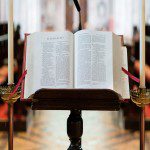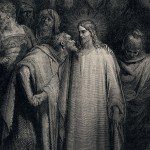
If a Protestant looking into the claims of Catholicism were to ask me, “What one book should I read, where I can find a quick answer to any question I have?” I would tell him to read Devin Rose’s new book The Protestant’s Dilemma (buy here).
I would also recommend this book to Protestant apologists, even those of many years, well-skilled in polemics. It will remind them of the heavy burden of proof they face, and the weakness of their position on point after point. The truth may set them free and bring them home too. (It has happened.)
All this may seem like overstatement—the obligatory praise from one Catholic blogger to another. But it is not.
Consider first the range of issues this book takes up. There are thirty-six chapters, each one on a different topic, from the papacy to sola scriptura, from the canon of the Bible to Purgatory, from confession to Eucharist to infant baptism. If something about the Catholic Church troubles you, this book has the answer. If you think you have found the point on which Catholicism fails, this book will show you why it is one more point upon which Protestantism fails.
Consider also the brevity. The book is just over 200 pages long, which means that Mr. Rose’s answers get to the root of the question without a knot of academic detail. That is harder to do than it might seem, which is why primers always get written by people who have spent a great deal of time thinking things through, and who know how to write. This is the book of a man who has spent a long time studying the questions that divide Protestants and Catholics, and who knows how to present his case in a way that is easy for anyone to understand. At the same time, the book is useful for the professional apologist, for it recalls his mind to the basics.
Mr. Rose’s signature style is to take what Protestants claim and follow it through to its logical conclusion. By doing so, he reveals to the reader those consequences that apologists seldom want to admit, or even flat-out deny. On top of that, in each chapter Mr. Rose uses antithesis in order to prove the Catholic claim. Thus each one is divided into two sections: (1) If Protestantism is true, then x; (2) Because Catholicism is true, then y. At the end, y always comes out the stronger of the two.
As just one example of this, we should look at how Mr. Rose handles the question of authority—in a chapter of less than six pages. Authority may be the one thing that most divides Catholics from Protestants. The Protestant looks to the Bible alone to tell him what is true. The Catholic looks to both the Bible and the teaching of the Church.
“If Protestantism is true,” chapter 12 begins, “we all decide for ourselves what God’s revelation means.”
No Protestant will want to admit this. We do not decide for ourselves, he would say; the Bible is our guide. We are bound by what it says. But in one paragraph—one paragraph, think about that!—Mr. Rose shows why such a claim is false in practice:
If, as Protestants believe, the Bible is the sole infallible rule of faith, God must have ensured that its meaning, at least on issues essential to salvation, would be clear to any Christian who reads it. He could not have allowed the Bible to be mysterious, obscure, or even slightly vague—even to people who weren’t fluent in Greek or Hebrew. This clarity would ensure unity of doctrine among all Bible-believing Christians throughout time. As we have seen, though, such unity does not exist. This is because, in the absence of an interpreting authority, every person is left to decide Scripture’s meaning for himself.
The Westminster Confession of Faith speaks of the “perspicuity” of Scripture, which means that the Bible is clear to any who take it up. If any one passage is not clear, related passages will clear it up for us. But to show why this is false, Mr. Rose cites two verses from 1 John. On the surface, they seem to be at odds with each other; he uses them to show why the Protestant is ultimately left to himself to decide how to reconcile them.
1 John 1:8 says that if we have no sin we deceive ourselves; but 1 John 3:6 says that if we remain in Christ we do not sin. Does that mean that no one remains in Christ? The Westminster formula can not tell us how to square the two. Each of us must make up his own answer.
The chapter continues:
Because Catholicism is true, the Bible was not intended to be studied in isolation from the Apostolic Tradition and apart from the teaching authority of Christ’s Church.
Mr. Rose shows how Catholic tradition—in particular, the distinction between mortal and venial sin—helps to explain the two passages in a way that does not leave each of us to his own fallible authority, and which maintains the unity of the faith and the unity of the body as Christ intended. Christ did not mean to leave us to our own flawed intellect. He did not abandon us to division.
I wish I had had this book three years ago when I was on my way home to the Catholic Church. I had to piece together the proofs of Catholic teaching from a variety of sources, but Mr. Rose’s book contains all the issues that I struggled with in a single place. Moreover, it has the great strength of following Protestant claims to their logical consequences. It does not merely show why Catholicism is true, but also why Protestantism can not be true.
If you are a Protestant, and thinking about coming home to the Catholic Church; or, if you are a Catholic who wants to understand better how to defend your faith to your Protestant friends, then you must get this book and read this book today. You can also visit Mr. Rose’s blog here.
***
If you like the content on this blog, your generous gift to the author helps to keep it active. I remember all my supporters in my Mass intentions each week.











